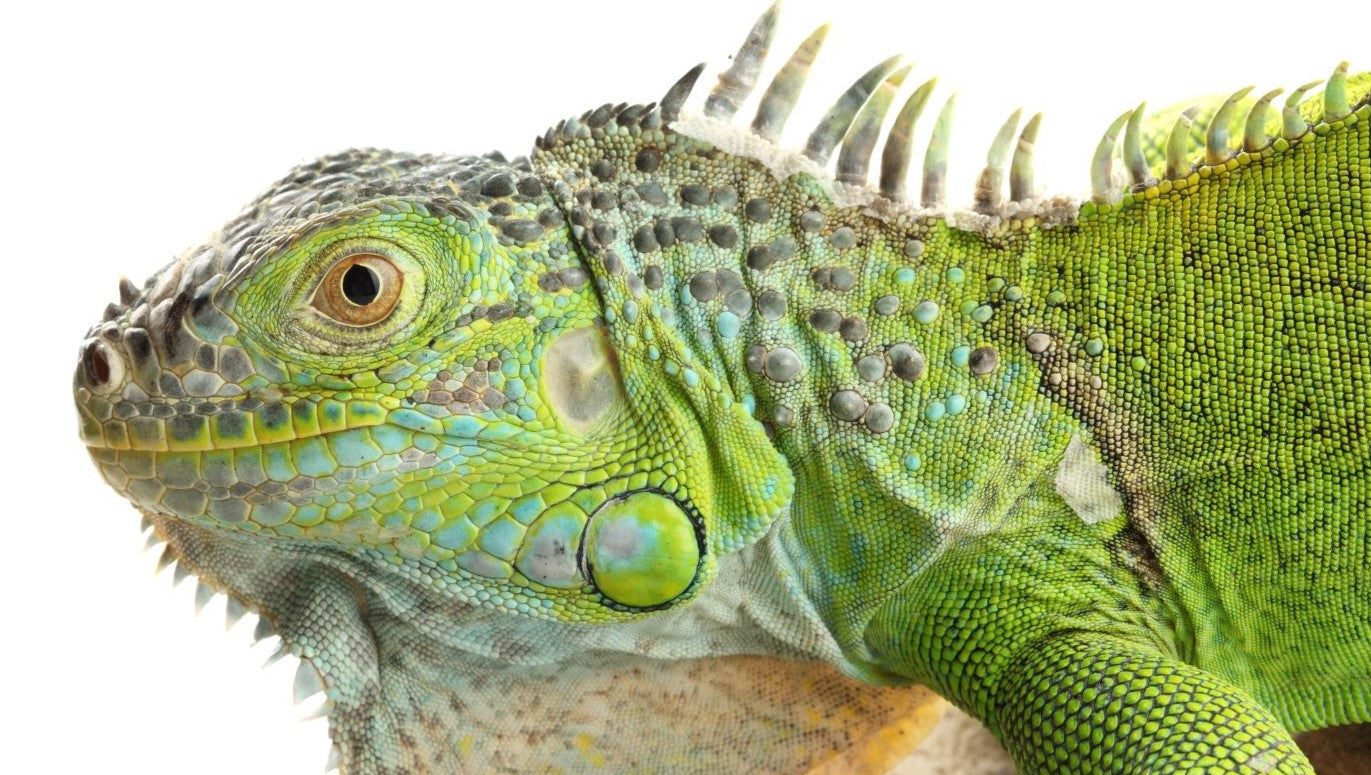The Green Iguana (Iguana Iguana), also known as the American Iguana, is native to South America, a large arboreal reptile they are what springs to people's minds when they often see or hear about a reptile as a pet. Strangely enough, they are not nearly the most popular reptile in the pet industry, but there are a lot of Iguana owners, nonetheless. The Green Iguana is a herbivorous reptile, eating fruits and vegetables solely in their captive diet. Although Iguanas have been observed consuming invertebrates in their natural habitat, there is some debate over whether they should be offered animal protein in captivity. It's not something they require, and it seems to be more of an opportunistic thing for them in the wild. There are also several commercial products available that have been formulated from fruits and vegetables to provide a sustainable diet for them, which can be used as their whole diet or to supplement their diet alongside fresh foods.
In captivity, some certain fruits and vegetables are better than others that are more healthy than others, and you must provide them with the correct ratio of the various nutrients that they require to stay healthy. Iguanas that are held in captivity are fed fruit, flowers, leafy greens, turnip greens, and shoots of plants, each of which contains varying amounts of vitamins, minerals, and nutrients. So what should you feed your pet Iguana?
How Often Do I Feed My Green Iguana?
All Iguanas should be offered food daily, regardless of age, which is in contrast to most other reptiles, which require different schedules depending on age. Older Iguanas may not be as hungry, and it is okay to skip a day here and there, but with baby and juvenile Iguanas, they must be fed daily. Foods should be chopped into sizes appropriate for the size Iguana and offered after the foods have been treated with the proper supplementation.
Goitrogenic Foods and Oxalic Foods
Oxalates bind calcium in the body, and they should be restricted in the diet of any species that requires a lot of calcium in their diet, such as the Green Iguana. Calcium is used to maintain a healthy bone structure. Without it, Iguanas can become susceptible to conditions like metabolic bone disease and other health issues related to a lack of calcium absorption. Foods that are high in phosphorous should also be avoided, and phosphorous has a similar effect to oxalates in the body as in that they also inhibit calcium absorption so can cause the same issues.
Goitrogenic foods also need to be limited in the Iguana's diet; goitrogens bind iodine which will inhibit iodine absorption in the body of the Iguana. Iodine is essential because it is used by the thyroid glands, which regulates the vital organs in the body. Lack of iodine absorption will lead to a malfunctioning thyroid gland and severe health complications.
The Best Vegetables To Feed My Green Iguana?
Vegetables make up the majority of your pet Iguana's diet, low in fat and sugar and high in vitamins and minerals they are the best foodstuffs for your pet aside from the commercially prepared diet products available. The following is a list of the best vegetables to feed your Iguana.
Vegetables:
- Alfalfa (Fresh)
- Arugula
- Butternut Squash
- Chicory
- Collard Greens
- Dandelion Greens/Flowers
- Endive
- Escarole
- Hibiscus flowers and leaves
- Mustard Greens
- Nasturtiums
- Prickly Pear Cactus Pads and Fruits
- Spaghetti Squash
- Thyme
- Turnip Greens
Occasional
- Acorn Squash
- Basil
- Cilantro
- Hubbard Squash
- Peppermint
- Scallop Squash
- Peppermint
- Rosemary
- Sage
- Summer Squash
- Watercress
Rare
- Artichoke Hearts
- Asparagus
- Bell Peppers
- Chayote
- Green Beans
- Kale
- Red Cabbage
- Parsnips
- Peas
- Pumpkin
Very Rare/Never
- Beetroot - (Goitrogenic)
- Bok Choy - (Goitrogenic)
- Broccoli
- Cauliflower - (Goitrogenic)
- Carrots
- Courgettes
- Cucumber
- Green Cabbage - (Goitrogenic)
- Kidney Beans
- Kohlrabi - (Goitrogenic)
- Lima Beans
- Okra - (High oxalates)
- Radicchio
- Radishes - (Goitrogenic)
- Turnips - (Goitrogenic)
- Wheatgrass
- Yam
Fruits That Can Be Fed To My Iguana?
Vegetables should make up the majority of every feeding your Iguana is offered. Still, fruit can provide essential vitamins and hydration that are also essential to your Iguana's health and vitality. Here is a list of fruits that can be offered to your Iguana.
Staple Fruits:
- Apples
- Cantaloupe
- Mango
- Papaya
Occasional Fruits:
- Blackberries
- Blueberries
- Cherries
- Cranberries
- Guava
- Pears
- Peaches
- Plums
- Raspberries
- Strawberries
Staple Flowers:
- Chamomile
- Chrysanthemum Petals
- Dandelions
- Hibiscus
- Hollyhock
- Lavender
- Marigold
- Nasturtium
- Rose Petals
Are Pellets Good For My Iguana?
There are several products available commercially that have been formulated to provide nutrition to your Iguana, these are best used in conjunction with a diet of fresh fruits and vegetables, and they are not bad for your Iguana. You should stick to the products made specifically for reptiles and not rodent pellets that some people may recommend you use. These have been made with vegetables and fruits that are safe for your Iguana to eat. These pellets can also be soaked in water to make them expand and provide a source of hydration and can also be used to administer medications to your Iguana should you be in a position where that is necessary. Here are some products we recommend.
- Zilla Munchies Vegetable Mix
- Zilla Munchies Vegetable and Fruit Mix
- Zilla Munchies Fruit Mix
- Zoo Med Juvenile Iguana Food
- Zoo Med Adult Iguana Gourmet Mix
Supplementation For Your Green Iguana
Supplements are an essential part of your Iguana's diet; the main focus is on calcium supplementation. They do not require extra vitamin D supplements as some reptiles do, but they do benefit from some vitamin supplementation. Here is an example of a schedule that can be used.
Baby - Juvenile Iguanas
Calcium powder - 3 days per week
Multivitamin powder - 1 day per week
Only supplement every other day, never consecutive days, and only use a small pinch of supplement powder each feeding. See below for supplements.
- Repti-Calcium without vitamin D3
- Exo-Terra Calcium Powder without D3
- Exo-Terra Multivitamin Powder
- Rep-Cal Multivitamin Powder
Green Iguana Water
Green Iguanas need a constant water source made available for them. Younger Iguanas may have issues finding their water, though, so you should offer them water using a spray bottle daily to ensure that they stay well hydrated. Bathing them a couple of times per week can also help as they can drink in the bath.
Providing them with a water dish, you should use one that is big enough for them to bathe in so it can fit their entire body. It may be useful for you to physically place them inside their water dish if they don't seem to get into it themselves to show them how to find it. Iguanas are great swimmers and will enjoy going in the water. Usually, tap water is fine, but if your area has particularly bad water or if you are not sure, then you can always treat the water before using it to make sure. See below for a product that you can use.


13 comments
Jeanette
Tysm this helps a lot for me
Jamie Williams
I found myself iguana sitting for my son n law,AND I HAVE A QUESTION, IS TIMOTHY HAY,OK FOR BEDDING ATHENA?,OUR IGUANA, S NAME!
Reptile Supply
Hi Kim — Chinese cabbage is a “sometimes” food.
Kim
Is Chinese Cabbage good , bad, sometimes, or never?
Reptile Supply
Hi Zachary — Although “green” is in their common name, the species “Iguana iguana” has a variety of colors available, including green, red/orange, yellow (albino), and aqua blue.
Leave a comment
All comments are moderated before being published.
This site is protected by hCaptcha and the hCaptcha Privacy Policy and Terms of Service apply.